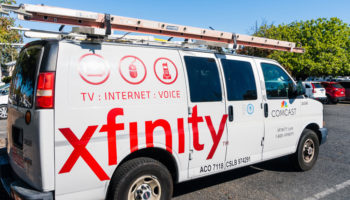Customers paid $29 extra per month if they did not want their data spied on.
AT&T (NYSE:T) has abruptly ended a controversial billing policy where it charged customers an extra monthly fee if they did not want to have their internet usage monitored.
Called “Internet Preferences,” the program was part of the company’s Google Fiber rival, GigaPower. That product competes with the Alphabet (NASDAQ: GOOG) (NASDAQ: GOOGL) service offering high-speed internet, pay television, and phone service.
AT&T’s differed from Google’s in that customers for GigaPower had to use Internet Preferences to opt out of having their online usage monitored by the company in order to serve them targeted ads. Users who chose to opt out had to pay $29 a month for stand-alone internet access while bundles including TV or phone service could cost more than $60 extra when customers opted out, according to Ars Tecnica.
AT&T pricing varied based on what Google charged in each market and it generally priced its overall service, including opting out, more in markets where the rival service did not operate.
What did AT&T change?
AT&T told Ars:
“To simplify our offering for our customers, we plan to end the optional Internet Preferences advertising program related to our fastest internet speed tiers. … As a result, all customers on these tiers will receive the best rate we have available for their speed tier in their area. We’ll begin communicating this update to customers early next week.” Ars reports that data collection and ad targeting will be turned off.
Why is AT&T doing this?
The company has not given a reason for its actions, but the program was always controversial. Earlier this year, the Federal Communications Commission (FCC) began considering new rules that would place restrictions on the data internet service providers (ISPs) collect.
The ISPs have been against these rules, arguing that companies like Facebook and Netflix collect data in order to shape user experience or (in the case of the social media site) serve ads. Members of the FCC argue that consumers can choose to use or not use a social or streaming service, but in most cases, they have very limited choice when it comes to ISPs.
AT&T took part in those hearings, but argued against the characterization of its policy as “pay for privacy.” Instead, the company’s regulatory affairs executive, Jacquelyne Flemming, framed it in a different way, Consumerist reported. “We, AT&T, have a broadband Internet access service that we market to customers that if you agree, if you opt-in, to the use of your data for various reasons, then you get a discount,” Flemming said. “That doesn’t mean that other people who don’t get the discount are paying for privacy. I wouldn’t say that.”
While she wouldn’t say it, that was exactly how the program worked. “I think that there is a benefit to the customer, and it’s not as if we’re talking [all] broadband Internet access services, of which there are a wide range of them that are available to customers. In this particular instance, if you like to get this benefit, then there is a reciprocal benefit to the customer and the company,” she said, Consumerist reported.
AT&T made the right call
While it’s easy to question the company’s motives and it’s very likely dropping these extra charges ahead of any rule changes made by the FCC, at least AT&T is making the move. Letting customers opt in or out of data collection makes sense, but charging for it creates a market where privacy becomes something reserved for wealthier people.
This was a smart change that may cost the company some money in the short term, but that cash was not worth the bad publicity that would come if the FCC had to force this change.
10 stocks we like better than AT and T
When investing geniuses David and Tom Gardner have a stock tip, it can pay to listen. After all, the newsletter they have run for over a decade, Motley Fool Stock Advisor, has tripled the market.*
From The Motley Fool – www.fool.com.





